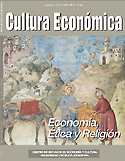Social Doctrine of the Church and Theory Economic: two divergent approaches for a world in transformation
Keywords:
ECONOMIC THEORY, SOCIAL DOCTRINE OF THE CHURCH, INDUSTRIAL REVOLUTION, MARXISM, GLOBALIZATION, ECONOMIC HISTORYAbstract
This article’s central subject is the importance of the intervention of the Church in social-economic issues. The author starts from two questions: the reason why the Social Doctrine of the Church was established only by the end of the XIX century and not before, and the reasons that led to the breakdown between the Social Doctrine of the Church and the prevailing economic theory. To give an answer to these points, Pasinetti dates back to the origin of Christianity, and makes a historical analysis of the development of economic theory until the proclamation of the Rerum Novarum encyclical in 1891. The author explains that this doctrinal corpus came up from three historical events: the Industrial Revolution, the impact of Karl Marx’s work, and the failure in formulating an economic theory able to solve the problems of a new world. The Social Doctrine of the Church, therefore, is meant to overcome these difficulties because it possesses the tools required to achieve this task.Downloads
References
Benedicto XVI (2010). Encíclica Caritas in veritate, Librería Editrice Vaticana, Cuidad del Vaticano.
Cipolla, Carlo M.(1978). The Economic History of World Population, The Harvester Press, Brighton.
FAO (2009). The State of Food security in the World. Economic Crisis – impact and lessons learned.
Harrod, Roy (1948). Towards a Dynamic Economics. Macmillan, London.
León XIII (1891). Encíclica Rerum Novarum (15 de mayo de 1891): Leonis XIII P.M Acta, XI, Roma.
Livi Bacci, M. (1998). Storia minima della popolazione del mondo. Il Mulino, Bologna.
Malthus, Robert (1798). An Essay on the Principle of Population, as it affects the future improvement of society with remarks on the speculations of Mr. Godwin, M. Condorcet and other writers (publicado en forma anónima).
Pasinetti, Luigi (1983) “The Accumulation of Capital”, in Cambridge Journal of Economics, vol. 7: 405-411.
Pasinetti, Luigi (1984) Dinamica strutturale e sviluppo economico – Un’indagine teorica sui mutamenti nella ricchezza delle nazioni. U.T.E.T, Torino.
Pasinetti, Luigi (2004) “Capitale”; voce nel Dizionario di dottrina sociale della Chiesa – Scienze sociali e Magistero. Vita & Pensiero, Milano: 170-
Pasinetti, Luigi (2007) (con la colaboración de GianPaolo Mariutti) “Globalizzazione economica: incentivi, ostacoli e sproporzioni”, en AA.VV. Globalizzazione e Trasmissione di Modeli Culturali e Formativi, Cicli di lezio28 ni, XXIII, (lezione presentata il 9 Maggio 2002 a Milano, Istituto Lombardo Accademia di Scienze e Lettere), LED, Edizioni Universitarie di Lettere Economia Diritto, Milano: 235-273.
Pasinetti, Luigi (2010) Keynes e i Keynesiani di Cambridge. Una ‘rivoluzione in economia’ da portare a compimento, (Collana Libri del Tempo), Editori Laterza, Roma.
Pontificio Consiglio della Giustizia e della Pace (2004). Compendio della Dottrina Sociale Della Chiesa, Libreria Editrice Vaticana, Città del Vaticano.
Smith, Adam [1776], (1976). An Inquiry into the Nature and Causes of the Wealth of Nations, a cura di Campbell, R.H. e Skinner, A. S., ‘The Glasgow edition of the Works and Correspondence of Adam Smith’,
Clarendon Press, Oxford.
Quesnay, François [1759], (2009), a cura di Giancarlo De Vivo, Il Tableau Économique, Fondazione Raffaele Mattioli, Milano.
Downloads
Published
How to Cite
Issue
Section
License












